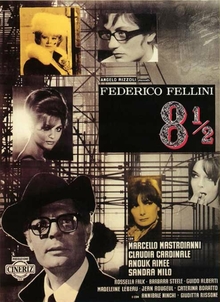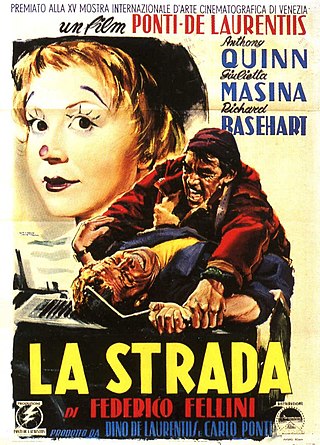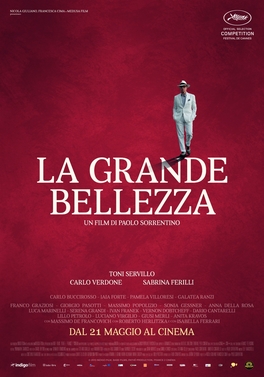
Federico Fellini was an Italian film director and screenwriter. He is known for his distinctive style, which blends fantasy and baroque images with earthiness. He is recognized as one of the greatest and most influential filmmakers of all time. His films have ranked highly in critical polls such as that of Cahiers du Cinéma and Sight & Sound, which lists his 1963 film 8+1⁄2 as the 10th-greatest film.

Giovanni Rota Rinaldi, better known as Nino Rota, was an Italian composer, pianist, conductor and academic who is best known for his film scores, notably for the films of Federico Fellini and Luchino Visconti. He also composed the music for two of Franco Zeffirelli's Shakespeare screen adaptations, and for the first two installments of Francis Ford Coppola's The Godfather trilogy, earning the Academy Award for Best Original Score for The Godfather Part II (1974).

Amarcord is a 1973 comedy-drama film directed by Federico Fellini, a semi-autobiographical tale about Titta, an adolescent boy growing up among an eccentric cast of characters in the village of Borgo San Giuliano in 1930s Fascist Italy. The film's title is a univerbation of the Romagnol phrase a m'arcôrd. The title then became a neologism of the Italian language, with the meaning of "nostalgic revocation". The central role of Titta is based on Fellini's childhood friend from Rimini, Luigi Titta Benzi. Benzi became a lawyer and remained in close contact with Fellini throughout his life.

8+1⁄2 is a 1963 Italian surrealist psychological comedy-drama film directed and co-written by Federico Fellini. The metafictional narrative centers on Guido Anselmi,, a famous Italian film director who suffers from stifled creativity as he attempts to direct an epic science fiction film. Claudia Cardinale, Anouk Aimée, Sandra Milo, Rossella Falk, Barbara Steele, and Eddra Gale portray the various women in Guido's life. The film is shot in black and white by cinematographer Gianni Di Venanzo and features a score by Nino Rota, with costume and set designs by Piero Gherardi.

Kerstin Anita Marianne Ekberg was a Swedish actress active in American and European films, known for her beauty and curvy figure. She became prominent in her iconic role as Sylvia in the Federico Fellini film La Dolce Vita (1960). Ekberg worked primarily in Italy, where she became a permanent resident in 1964.

Circus clowns are a sub-genre of clowns. They typically perform at circuses and are meant to amuse, entertain and make guests laugh.

Cinecittà Studios is a large film studio in Rome, Italy. With an area of 400,000 square metres, it is the largest film studio in Europe, and is considered the hub of Italian cinema. The studios were constructed during the Fascist era as part of a plan to revive the Italian film industry.

La strada is a 1954 Italian drama film directed by Federico Fellini and co-written by Fellini, Tullio Pinelli and Ennio Flaiano. The film tells the story of Gelsomina, a simple-minded young woman bought from her mother by Zampanò, a brutish strongman who takes her with him on the road.

Il divo is a 2008 Italian biographical drama film directed by Paolo Sorrentino. It is based on the figure of former Italian Prime Minister Giulio Andreotti. It competed at the Cannes Film Festival in 2008, where it was awarded the Jury Prize. The film also screened at the Toronto International Film Festival and was nominated for the Oscar for Best Makeup at the 82nd Academy Awards in 2010.

Totò Tarzan is a 1950 Italian comedy film directed by Mario Mattoli and starring Totò, Marilyn Buferd and Alba Arnova. It is a parody of Edgar Rice Burroughs's novel Tarzan of the Apes. It was shot at the Farnesina Studios in Rome. The film's sets were designed by the art director Piero Filippone. As with Totò's other films of the era it was a commercial success, taking around 385 million lira at the box office.

Giacomo Matteo Furia was an Italian film, television and stage actor. He appeared in more than 130 films between 1948 and 1998.

Liana Orfei is an Italian actress and circus artist. She appeared in more than 30 films between 1959 and 1971.

Ferdinando I, re di Napoli is a 1959 Italian comedy film directed by Gianni Franciolini.

Tomorrow Is Another Day is a 1951 Italian melodrama film directed by Léonide Moguy and starring Pier Angeli, Aldo Silvani and Anna Maria Ferrero. It was produced as a follow-up to the hit film Tomorrow Is Too Late also directed by Moguy and starring Angeli in her screen debut. Afterwards Angeli moved to Hollywood as a contract star of MGM.

The Shortest Day is a 1963 Italian comedy film. It is a parody of the war movie The Longest Day and stars the popular duo Franco and Ciccio in the leading roles. Dozens of other well-known actors, from both European and American cinema, agreed to appear in the movie in cameo roles for free to avert the bankruptcy of the production company, Titanus.

The Great Beauty is a 2013 art drama film co-written and directed by Paolo Sorrentino. Filming took place in Rome starting on 9 August 2012. It premiered at the 2013 Cannes Film Festival where it was screened in competition for the Palme d'Or. It was shown at the 2013 Toronto International Film Festival, the 2013 Tallinn Black Nights Film Festival, and at the 2013 Reykjavik European Film Festival.
The Nastro d'Argento is a film award assigned each year, since 1948, by Sindacato Nazionale dei Giornalisti Cinematografici Italiani, the association of Italian film critics.
This is a list of Italian television related events from 1964.

Il ragazzo che sorride is a 1969 Italian musicarello comedy film directed by Aldo Grimaldi and starring Al Bano and Susanna Martinková.
This is a list of Italian television related events from 1979.

















